志愿者实用英语口语
- 格式:doc
- 大小:77.00 KB
- 文档页数:34
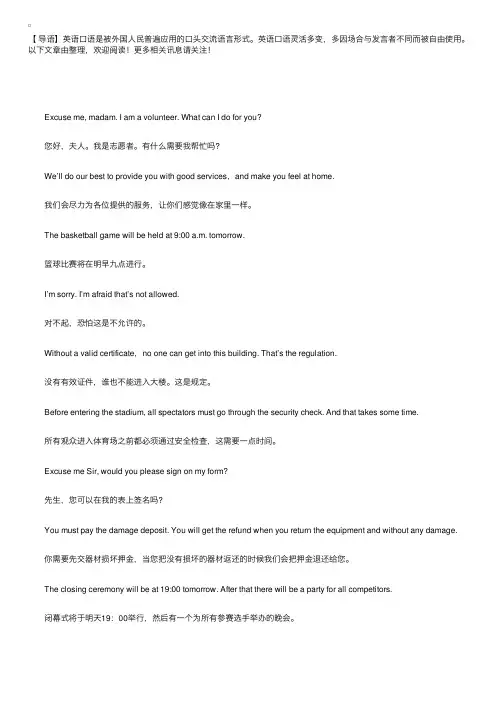
【导语】英语⼝语是被外国⼈民普遍应⽤的⼝头交流语⾔形式。
英语⼝语灵活多变,多因场合与发⾔者不同⽽被⾃由使⽤。
以下⽂章由整理,欢迎阅读!更多相关讯息请关注! Excuse me, madam. I am a volunteer. What can I do for you? 您好,夫⼈。
我是志愿者。
有什么需要我帮忙吗? We’ll do our best to provide you with good services,and make you feel at home. 我们会尽⼒为各位提供的服务,让你们感觉像在家⾥⼀样。
The basketball game will be held at 9:00 a.m. tomorrow. 篮球⽐赛将在明早九点进⾏。
I’m sorry. I’m afraid that’s not allowed. 对不起,恐怕这是不允许的。
Without a valid certificate,no one can get into this building. That’s the regulation. 没有有效证件,谁也不能进⼊⼤楼。
这是规定。
Before entering the stadium, all spectators must go through the security check. And that takes some time. 所有观众进⼊体育场之前都必须通过安全检查,这需要⼀点时间。
Excuse me Sir, would you please sign on my form? 先⽣,您可以在我的表上签名吗? You must pay the damage deposit. You will get the refund when you return the equipment and without any damage. 你需要先交器材损坏押⾦,当您把没有损坏的器材返还的时候我们会把押⾦退还给您。
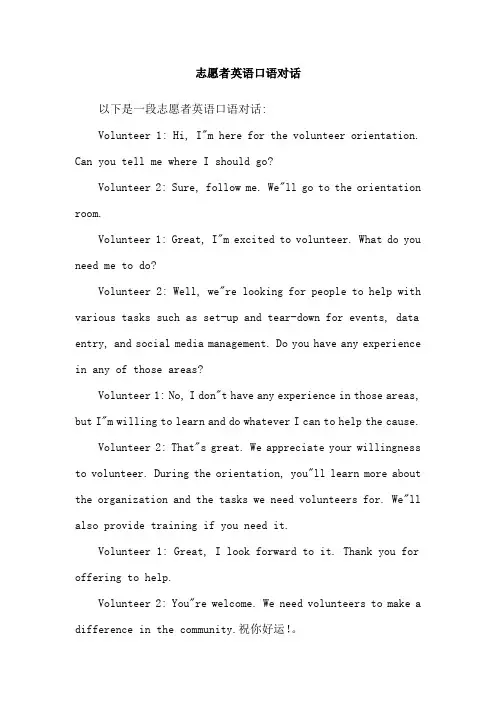
志愿者英语口语对话以下是一段志愿者英语口语对话:Volunteer 1: Hi, I"m here for the volunteer orientation. Can you tell me where I should go?Volunteer 2: Sure, follow me. We"ll go to the orientation room.Volunteer 1: Great, I"m excited to volunteer. What do you need me to do?Volunteer 2: Well, we"re looking for people to help with various tasks such as set-up and tear-down for events, data entry, and social media management. Do you have any experience in any of those areas?Volunteer 1: No, I don"t have any experience in those areas, but I"m willing to learn and do whatever I can to help the cause. Volunteer 2: That"s great. We appreciate your willingness to volunteer. During the orientation, you"ll learn more about the organization and the tasks we need volunteers for. We"ll also provide training if you need it.Volunteer 1: Great, I look forward to it. Thank you for offering to help.Volunteer 2: You"re welcome. We need volunteers to make a difference in the community.祝你好运!。
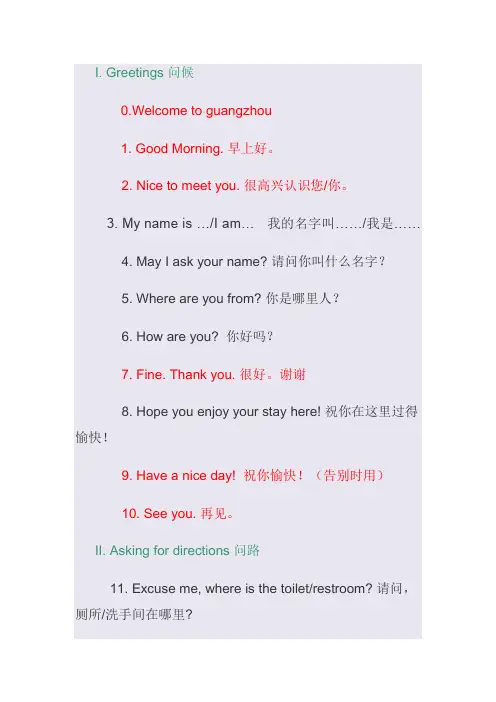
I. Greetings 问候0.Welcome to guangzhou1. Good Morning. 早上好。
2. Nice to meet you. 很高兴认识您/你。
3. My name is …/I am…我的名字叫……/我是……4. May I ask your name? 请问你叫什么名字?5. Where are you from? 你是哪里人?6. How are you? 你好吗?7. Fine. Thank you. 很好。
谢谢8. Hope you enjoy your stay here! 祝你在这里过得愉快!9. Have a nice day! 祝你愉快!(告别时用)10. See you. 再见。
II. Asking for directions 问路11. Excuse me, where is the toilet/restroom? 请问,厕所/洗手间在哪里?12. How can I get to the subway station? 去地铁站怎么走?13. Go straight. 直走。
14. Turn left/right. 左/右转15.Walk across the road(the underpass/footbridge).穿过马路(地下通道/人行桥)。
16. It’s (not) far. (不)远。
17. It's a five-minute walk. 走路五分钟。
!18. It is on Tiyu XiLu/on the fifth floor/on the left/right. 在体育西路/五楼/你的左边/右边。
19. It is opposite (to) the bank. 在银行对面。
20. Sorry, I don’t know. 对不起,我不知道。
III. Transportation 交通21. Which bus (Which subway line) goes to Beijing Lu? 哪路车(几号地铁线)去北京路?Bus 544/Line 1 goes there. 544路公车/一号线去那儿。
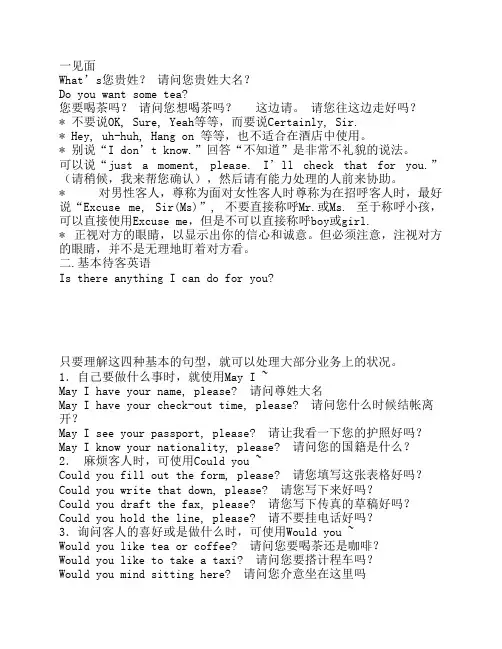
一见面What’s您贵姓? 请问您贵姓大名?Do you want some tea?您要喝茶吗? 请问您想喝茶吗? 这边请。
请您往这边走好吗?* 不要说OK, Sure, Yeah等等,而要说Certainly, Sir.* Hey, uh-huh, Hang on 等等,也不适合在酒店中使用。
* 别说“I don’t know.”回答“不知道”是非常不礼貌的说法。
可以说“just a moment, please. I’ll check that for you.”(请稍候,我来帮您确认),然后请有能力处理的人前来协助。
* 对男性客人,尊称为面对女性客人时尊称为在招呼客人时,最好说“Excuse me, Sir(Ms)”, 不要直接称呼Mr.或Ms. 至于称呼小孩,可以直接使用Excuse me,但是不可以直接称呼boy或girl.* 正视对方的眼睛,以显示出你的信心和诚意。
但必须注意,注视对方的眼睛,并不是无理地盯着对方看。
二.基本待客英语Is there anything I can do for you?只要理解这四种基本的句型,就可以处理大部分业务上的状况。
1.自己要做什么事时,就使用May I ~May I have your name, please? 请问尊姓大名May I have your check-out time, please? 请问您什么时候结帐离开?May I see your passport, please? 请让我看一下您的护照好吗?May I know your nationality, please? 请问您的国籍是什么?2. 麻烦客人时,可使用Could you ~Could you fill out the form, please? 请您填写这张表格好吗?Could you write that down, please? 请您写下来好吗?Could you draft the fax, please? 请您写下传真的草稿好吗?Could you hold the line, please? 请不要挂电话好吗?3.询问客人的喜好或是做什么时,可使用Would you ~Would you like tea or coffee? 请问您要喝茶还是咖啡?Would you like to take a taxi? 请问您要搭计程车吗?Would you mind sitting here? 请问您介意坐在这里吗** 只要在疑问词后加“Would you ~”,就可以提出大部分的询问。
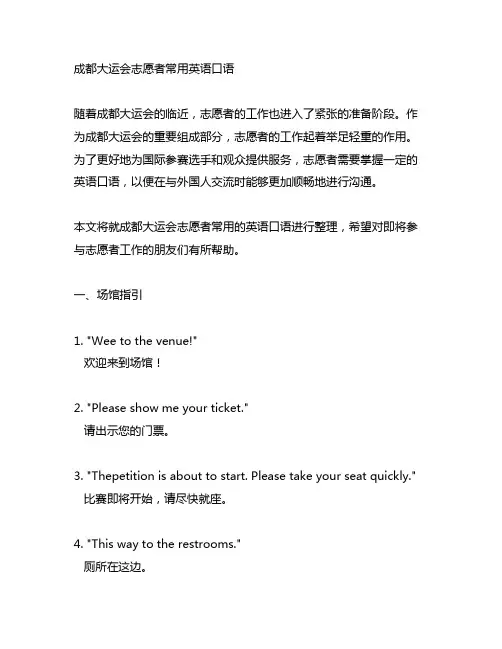
成都大运会志愿者常用英语口语随着成都大运会的临近,志愿者的工作也进入了紧张的准备阶段。
作为成都大运会的重要组成部分,志愿者的工作起着举足轻重的作用。
为了更好地为国际参赛选手和观众提供服务,志愿者需要掌握一定的英语口语,以便在与外国人交流时能够更加顺畅地进行沟通。
本文将就成都大运会志愿者常用的英语口语进行整理,希望对即将参与志愿者工作的朋友们有所帮助。
一、场馆指引1. "Wee to the venue!"欢迎来到场馆!2. "Please show me your ticket."请出示您的门票。
3. "Thepetition is about to start. Please take your seat quickly." 比赛即将开始,请尽快就座。
4. "This way to the restrooms."厕所在这边。
5. "Please keep the venue clean and tidy."请保持场馆的清洁和整洁。
二、赛事信息1. "The next game will be held at 3:00 pm."下一场比赛将于下午3点举行。
2. "Please pay attention to the schedule for the day."请留意当天的赛程安排。
3. "The award ceremony will be held at the main stage after the game."比赛结束后将在主舞台举行颁奖典礼。
4. "Security measures have been taken to ensure the safety of all participants."已采取安全措施确保所有参赛者的安全。
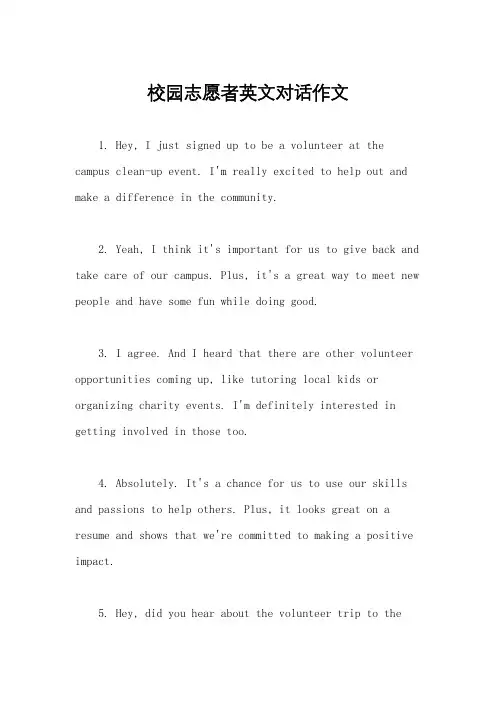
校园志愿者英文对话作文1. Hey, I just signed up to be a volunteer at the campus clean-up event. I'm really excited to help out and make a difference in the community.2. Yeah, I think it's important for us to give back and take care of our campus. Plus, it's a great way to meet new people and have some fun while doing good.3. I agree. And I heard that there are other volunteer opportunities coming up, like tutoring local kids or organizing charity events. I'm definitely interested in getting involved in those too.4. Absolutely. It's a chance for us to use our skills and passions to help others. Plus, it looks great on a resume and shows that we're committed to making a positive impact.5. Hey, did you hear about the volunteer trip to theanimal shelter next weekend? I'm thinking about signing up for that too. It would be so rewarding to help those cute little animals find their forever homes.6. Oh, I didn't know about that. Thanks for telling me. I'll definitely look into it. I love animals and it would be amazing to be able to help them in any way I can.。
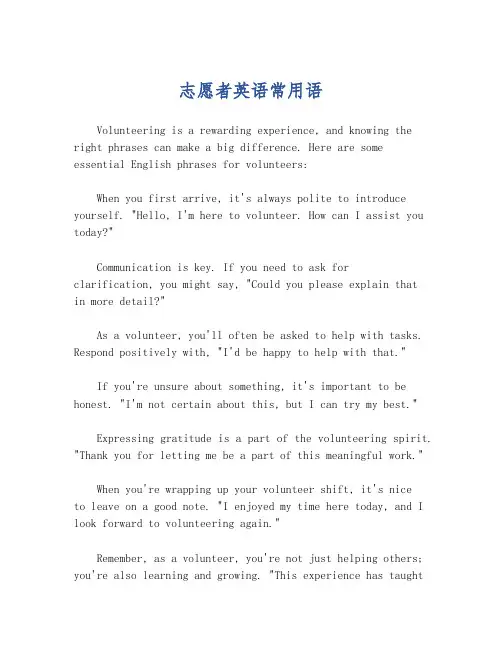
志愿者英语常用语Volunteering is a rewarding experience, and knowing the right phrases can make a big difference. Here are some essential English phrases for volunteers:When you first arrive, it's always polite to introduce yourself. "Hello, I'm here to volunteer. How can I assist you today?"Communication is key. If you need to ask forclarification, you might say, "Could you please explain thatin more detail?"As a volunteer, you'll often be asked to help with tasks. Respond positively with, "I'd be happy to help with that."If you're unsure about something, it's important to be honest. "I'm not certain about this, but I can try my best."Expressing gratitude is a part of the volunteering spirit. "Thank you for letting me be a part of this meaningful work."When you're wrapping up your volunteer shift, it's niceto leave on a good note. "I enjoyed my time here today, and I look forward to volunteering again."Remember, as a volunteer, you're not just helping others; you're also learning and growing. "This experience has taughtme a lot about the importance of community service."Lastly, if you're looking to continue your volunteer work, ask about future opportunities. "Are there any upcomingevents where I could lend a hand?"。
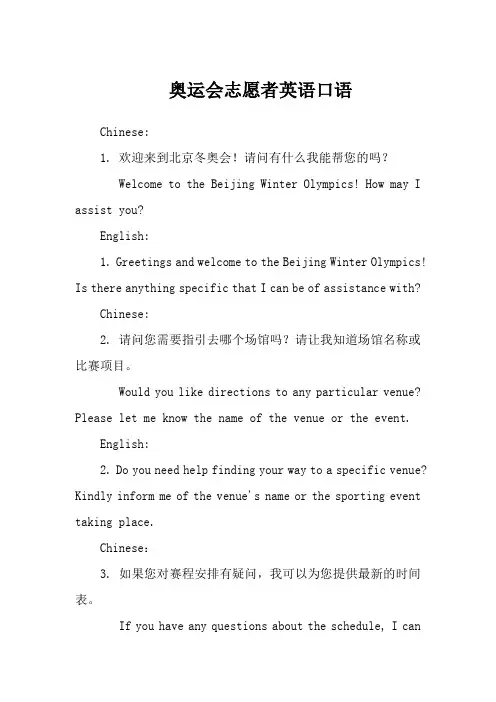
奥运会志愿者英语口语Chinese:1. 欢迎来到北京冬奥会!请问有什么我能帮您的吗?Welcome to the Beijing Winter Olympics! How may I assist you?English:1. Greetings and welcome to the Beijing Winter Olympics! Is there anything specific that I can be of assistance with?Chinese:2. 请问您需要指引去哪个场馆吗?请让我知道场馆名称或比赛项目。
Would you like directions to any particular venue? Please let me know the name of the venue or the event.English:2. Do you need help finding your way to a specific venue? Kindly inform me of the venue's name or the sporting event taking place.Chinese:3. 如果您对赛程安排有疑问,我可以为您提供最新的时间表。
If you have any questions about the schedule, I canprovide you with the latest timetable.English:3. Should you have any queries regarding the event schedule, I'm more than happy to furnish you with the most up-to-date timetable.Chinese:4. 对不起,现在这个区域正在进行安检,请您配合并耐心等待。
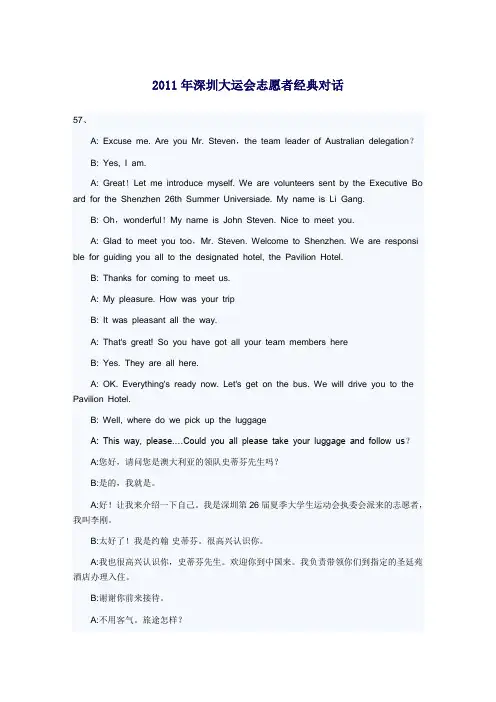
2011年深圳大运会志愿者经典对话57、A: Excuse me. Are you Mr. Steven,the team leader of Australian delegation?B: Yes, I am.A: Great!Let me introduce myself. We are volunteers sent by the Executive Bo ard for the Shenzhen 26th Summer Universiade. My name is Li Gang.B: Oh,wonderful!My name is John Steven. Nice to meet you.A: Glad to meet you too,Mr. Steven. Welcome to Shenzhen. We are responsi ble for guiding you all to the designated hotel, the Pavilion Hotel.B: Thanks for coming to meet us.A: My pleasure. How was your tripB: It was pleasant all the way.A: That's great! So you have got all your team members hereB: Yes. They are all here.A: OK. Everything's ready now. Let's get on the bus. We will drive you to the Pavilion Hotel.B: Well, where do we pick up the luggageA: This way, please.…Could you all please take your luggage and follow us?A:您好,请问您是澳大利亚的领队史蒂芬先生吗?B:是的,我就是。
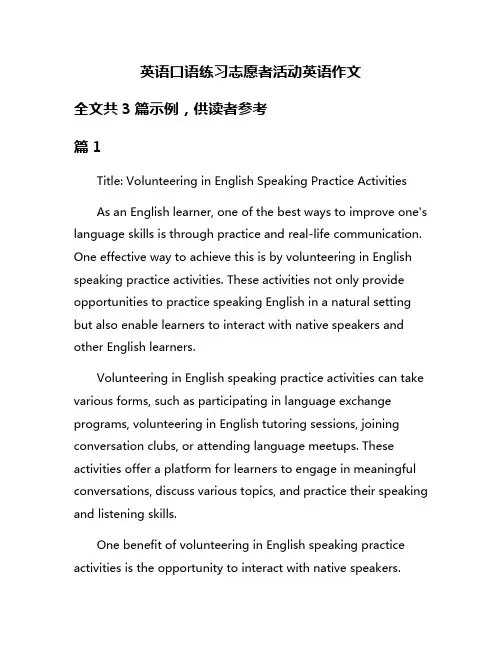
英语口语练习志愿者活动英语作文全文共3篇示例,供读者参考篇1Title: Volunteering in English Speaking Practice ActivitiesAs an English learner, one of the best ways to improve one's language skills is through practice and real-life communication. One effective way to achieve this is by volunteering in English speaking practice activities. These activities not only provide opportunities to practice speaking English in a natural setting but also enable learners to interact with native speakers and other English learners.Volunteering in English speaking practice activities can take various forms, such as participating in language exchange programs, volunteering in English tutoring sessions, joining conversation clubs, or attending language meetups. These activities offer a platform for learners to engage in meaningful conversations, discuss various topics, and practice their speaking and listening skills.One benefit of volunteering in English speaking practice activities is the opportunity to interact with native speakers.Communicating with native speakers allows learners to become more accustomed to the natural flow of the language, improve their pronunciation, and pick up on nuances in the language that may not be evident in textbooks or classroom settings.Moreover, volunteering in English speaking practice activities enables learners to practice speaking in real-life scenarios. By engaging in conversations with native speakers and other learners, individuals can build their confidence in speaking English, expand their vocabulary, and enhance their communication skills.Apart from improving language skills, volunteering in English speaking practice activities also offers the chance to make friends and connections with people from different backgrounds. Language exchange programs, conversation clubs, and meetups bring together individuals with a common goal of improving their English skills, creating a supportive and inclusive environment for learning and socializing.In conclusion, volunteering in English speaking practice activities is a valuable opportunity for English learners to enhance their language skills, build confidence in speaking, and connect with others. By engaging in these activities, individuals can strengthen their communication abilities, broaden theircultural knowledge, and enjoy the benefits of learning a new language in a fun and interactive way.Overall, volunteering in English speaking practice activities is a rewarding experience that can contribute to personal growth and linguistic development. It is an excellent way to immerse oneself in the English language, interact with native speakers, and build connections with fellow language learners. So, why not consider volunteering in English speaking practice activities and embark on a journey to improve your English skills while making meaningful connections along the way.篇2Title: Volunteering in English Speaking Practice ActivityVolunteering is a great way to give back to the community and make a positive impact on others. One such volunteering activity that I have been a part of is the English speaking practice program. This program aims to help non-native English speakers improve their English speaking skills through regular practice sessions with native English speakers.As a volunteer in this program, my role is to engage in conversations with the participants, help them improve their pronunciation, grammar, and vocabulary, and provide them withfeedback and tips to enhance their speaking skills. I am also responsible for creating a supportive and encouraging environment for the participants to feel comfortable and confident in practicing their English.One of the main challenges I faced when I first started volunteering in this program was how to effectively communicate with participants who may have limited English proficiency. However, with time and practice, I have learned to use simple language, gestures, and visual aids to facilitate communication and ensure that the participants understand me easily.Through my involvement in this volunteering activity, I have not only helped others improve their English speaking skills but also gained valuable experiences and insights. I have learned to be patient, empathetic, and adaptable when working with individuals from diverse backgrounds and cultures. I have also developed my communication and interpersonal skills, which are essential in both personal and professional settings.Overall, volunteering in the English speaking practice program has been a fulfilling and rewarding experience for me. It has allowed me to use my language skills to make a positive impact on others, while also enhancing my own personal andprofessional development. I look forward to continuing my involvement in this program and contributing to the growth and success of its participants.篇3Volunteering for English Speaking PracticeAs someone who is passionate about learning English and helping others, I decided to volunteer for an English speaking practice program in my community. This program pairs native English speakers with English language learners to provide them with opportunities to practice and improve their language skills in a supportive environment. The benefits of this program are twofold – English language learners get to practice their speaking skills with a native speaker, and volunteers get the satisfaction of helping others improve their English.I first heard about this program through a friend who had volunteered for it before. She told me about the positive experiences she had and how rewarding it was to see the improvement in the English language learners she worked with. I decided to sign up and attend an orientation session to learn more about the program and how I could get involved.At the orientation session, I met other volunteers who shared the same passion for English and helping others. We were given training on how to effectively communicate with English language learners, as well as tips on how to create a supportive and encouraging environment for them to practice their speaking skills. After the training, I was paired with a small group of English language learners who were at different levels of proficiency.I met with my group once a week for an hour-long session where we would engage in conversations on a variety of topics. I encouraged them to speak as much as possible and provided them with feedback on their pronunciation, grammar, and vocabulary. We also played games and did activities that were designed to improve their speaking skills in a fun and interactive way.Over time, I could see the progress that my group was making. They became more confident in their speaking abilities and were able to express themselves more fluently and accurately. It was incredibly rewarding to see the impact that my volunteering was having on their language skills and their overall confidence in speaking English.Through this experience, I also learned a lot about different cultures and perspectives from the English language learners in my group. We would often discuss topics such as food, travel, and traditions, which allowed me to gain a deeper understanding of their backgrounds and experiences. It was a truly enriching experience that not only improved their English skills but also broadened my own horizons.In conclusion, volunteering for an English speaking practice program has been a fulfilling and rewarding experience for me. I have been able to share my passion for English with others and help them improve their language skills in a supportive and encouraging environment. I would encourage anyone who is interested in English and helping others to consider volunteering for a similar program – the impact you can make is truly invaluable.。
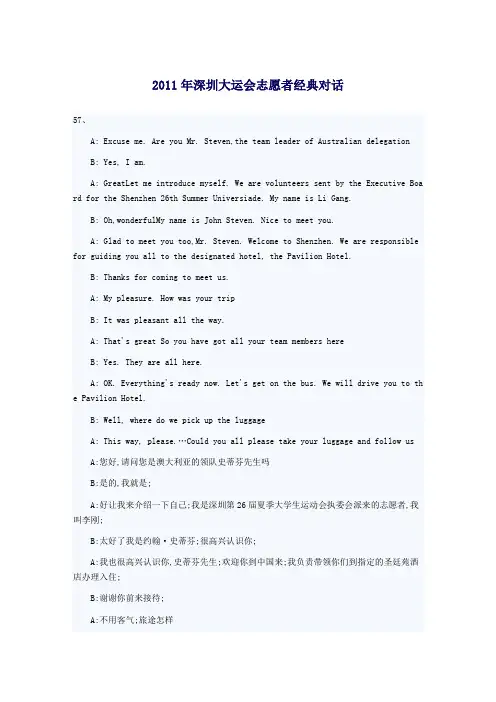
2011年深圳大运会志愿者经典对话57、A: Excuse me. Are you Mr. Steven,the team leader of Australian delegationB: Yes, I am.A: GreatLet me introduce myself. We are volunteers sent by the Executive Boa rd for the Shenzhen 26th Summer Universiade. My name is Li Gang.B: Oh,wonderfulMy name is John Steven. Nice to meet you.A: Glad to meet you too,Mr. Steven. Welcome to Shenzhen. We are responsible for guiding you all to the designated hotel, the Pavilion Hotel.B: Thanks for coming to meet us.A: My pleasure. How was your tripB: It was pleasant all the way.A: That's great So you have got all your team members hereB: Yes. They are all here.A: OK. Everything's ready now. Let's get on the bus. We will drive you to th e Pavilion Hotel.B: Well, where do we pick up the luggageA: This way, please.…Could you all please take your luggage and follow usA:您好,请问您是澳大利亚的领队史蒂芬先生吗B:是的,我就是;A:好让我来介绍一下自己;我是深圳第26届夏季大学生运动会执委会派来的志愿者,我叫李刚;B:太好了我是约翰·史蒂芬;很高兴认识你;A:我也很高兴认识你,史蒂芬先生;欢迎你到中国来;我负责带领你们到指定的圣廷苑酒店办理入住;B:谢谢你前来接待;A:不用客气;旅途怎样B:一直很愉快;A:那就好你们代表团的所有团员都到齐了吗B:是的;都到齐了;A:好的;所有东西都准备好了;我们上车吧;我们将开车送你们到圣廷苑酒店;B:好啊;我们在哪里取行李A:在这边……请带上所有的行李跟我走;58、A: Hi, Mr. Li I come here to express my appreciation for your help all these days. I really enjoy my stay here.B: You're welcome.A: I'm returning to America today. So I thank you for all the time you've sp ent on my account during my stay here.B: Don't mention it. I was only too pleased to be of assistance.A: If there's anything that I can help you with in the future, please let me know.B: Thank you. Have a safe trip home.A: Sure. Take care.A:您好,李先生;我是专程前来对您的帮助表示感谢的;我在这里过得很愉快;B:不用客气;A:我今天就要回美国了;所以我感谢您在我逗留期间给予的帮助;B:别客气;我十分高兴能帮上忙;A:如果将来有什么需要我帮忙的话,找我好了;B:谢谢;祝您一路顺风;A:我会的;您保重;59、A: Excuse me. Are you a volunteerB: Yes, I am. What can I do for you, sirA: Can you tell me what's going on here Why can't we go into the stadiumB: I'm sorry, sir. Before entering the stadium, all spectators must go throu gh the security check. And that takes some time.A: I see. It seems that we have to wait quite a while.B: I'm sorry about that. But this is a necessary procedure.A: But look at such a long line…B: Please accept our apology. I hope you can understand.A: That's all right. You're doing what you have to do.B: Thank you for your understanding. I'm sure it won't take too long.A:打扰一下;请问你是志愿者吗B:是的;请问我有什么可以帮忙的吗A:你能告诉我这儿发生了什么事吗为什么我们不能进体育场B:对不起,先生;所有观众进入体育场之前都必须通过安全检查,这需要一点时间;A:原来是这样;看来我们得等上好一会儿了;B:非常抱歉;但这是个必要的程序;A:可是你看看这老长的队伍;;;;;;B:请接受我们的歉意;希望你能理解;A:没关系;我们只是尽力在做好工作而已;B:谢谢您的理解;我相信这不会占太长时间的;60、A: Good afternoon, madam. Is there anything that I can do for youB: Oh, yes, please. Could you help me carry these baggages to the gate over thereA: No problem.B: It's really nice of you.A: My pleasure.B: By the way, could you tell me how I can get to the airportA: You can take the bus to get there. The bus station is just around the cor ner.B: How long will it take me to get thereA: About an hour, I think.B: My flight is at four o'clock. I'm afraid I won't be able to make it.A: If that's the case, I'd suggest you take a taxi.B: Sounds right.A: If you don't mind, you may stay here with your baggages while I go get yo u a taxi.B: That would be very nice of you. Thank you very much.A: You are welcome.A:下午好,女士;有什么需要我帮忙的吗B:哦,好的,谢谢;可以帮我把这些行李箱搬到那边的大门口吗A:没问题;B:你真好;A:我很高兴能帮上忙;B:我还想问问我怎样去机场A:您可以坐公共汽车去;汽车站就在转角处;B:我去到那儿要多久A:我想大约要一个小时;B:我要赶4点的航班,恐怕来不及;A:这样的话,我建议您打出租车去;B:好主意;A:如果您不介意的话,您可以在这里看着行李,我帮您叫出租车;B:那真是太感谢你了;A:不用客气;2011年深圳大运会志愿者经典对话61、A:Excuse me, Miss. You look puzzled. Can I help youB: Oh, yes. I seem to be lost. Could you tell me how I can get to the Diwang Bui ldingA: Sure. You can take the subway to get there.B: I just can't figure out the subway system at all. As soon as I get undergroun d I lose my sense of direction.A: Or you can take Bus to get there. The bus station is just across the street, seeB: Oh, I get it. Thank you.A: And could you tell me the way to the nearest bank I need to draw out some mon ey.B: The bank may be far away from here. I would advise you to use ATM. There are some ATMs on the second floor of this building. You may take the escalator around th at corner.A: Thank you very much.B: No problem. Have a nice day.A:小姐,您好;您看上去很困惑;需要帮忙吗B:哦;好啊;我好像迷路了;你能告诉我怎么去地王大厦吗A:当然可以;坐地铁就能直接到达;B:我看不懂地铁路线,只要下到地下,我就迷失了方向感;A:或者您可以坐12号公共汽车去;车站就在马路对面,看见了吗B:哦,看见了;谢谢;还想问问最近的银行在哪里我需要取点钱;A:这里离银行可能挺远的;我建议你使用自动取款机;这栋楼的二楼有几台,您可以在那边拐角搭电梯上去;B:非常感谢;A:不用客气;祝您今天玩得开心;62、A:What's the trouble with youB: I fell off my bike and hurt my legs.A: Where exactly does it hurtB: Right here.A: It's all bruised and swollen. Take it easy. I'm giving you a first aid right now.…B: How do you feel nowA: The pain relieves now. Can I go back to my gameB: Maybe you should wait a few more minutes. But don't worry. You'll be alright soon.A:你怎么了B:我从单车上摔下来,弄伤了我的脚;A:你痛的地方在哪里B:就在这里;A:充血红肿了;放松点;我现在给你作紧急处理;……A:现在觉得怎么样了B:疼痛缓解了;我可以回去比赛吗A:也许你再等上几分钟;不过不用担心,很快就会好的;63、A: Excuse me, madam. I am a volunteer. What can I do for youB: I'm looking for Gate F. My friends and I are supposed to meet there. But I se em to be lost.A: Don't worry. I'll show you the way. This way please.B: That's very nice of you.A: My pleasure.……A: Here we are.B: Oh, I can see my friends there. Thank you very much. By the way, where is the nearest rest roomA: Go to the second floor and you will find it on your right.B: Thanks a lot.A: Enjoy your game.A:您好,夫人;我是志愿者;有什么需要我帮忙吗B:我在找F大门;我和朋友约好了在那儿等;但我好像迷路了;A:别着急,我来给你指路;请这边走;B:非常感谢;A:不用客气;……B:我们到了;A:哦,我看见我的朋友了;非常感谢你;顺便问问,最近的洗手间在哪里B:上二楼后的右手边;A:谢谢;B:祝您愉快;64、A: Attention, pleaseThere is a fire in this building. Every one must leave this building as soon as possible. Follow the escape signs and get out of here quickly an d calmly. This is not a drill. This is a real emergency evacuation.B: Oh GoshHow could this happen I've got some very important documents in my off ice on the third floor. I have to get themA: No, sir You mustn't go upstairs. It's too dangerous. Every one must be evacua ted immediately.B: You don't understand. Those documents are extremely essential. I must get the mA: I'm very sorry, sir, but no I'm sure you don't want to jeopardize your life a s well as others'.B: But …A: Trust me. The fire engine's just arrived. The firemen will do whatever they c an to put out the fire. Everything's going to be OK.A:请注意本大厦发生火灾;所有人必须尽快离开;请按逃生标志迅速而冷静地离开;这不是演习,而是真的紧急疏散;B:天啊怎么发生这种事我三楼的办公室里还有些重要文件;我得去取出来;A:不,先生您不能到楼上去;上面非常危险;所有人都必须立即撤离;B:你不明白;那些文件太重要了;我一定得取出来;A:非常抱歉,但您真的不能去我相信您一定不希望危害自己和他人的生命的;B:但是……A:相信我;消防车刚刚赶到;消防员会尽力扑救的;不会有太大问题的;65、A:Ladies and gentlemen, this is the Security Check Please show us your certific ates before entering the building.B: Here is my certificate.A: Thanks. Please wait a second.……A: Sir, the certificate you're holding is not valid. I'm afraid you can't get i n.B: How's that possible I got in with the same certificate last timeA: I'm sorry. Please have a look at the date on your certificate. It's already e xpired. Please renew it.B: Oh…Well, it's been just one day. Can you just let me inA: I'm so sorry. But that's not allowed.B: Come on You've seen me several times.A: Without a valid certificate, no one can get in this building. That's the regu lation. I hope you can understand.B: Alright.A:女士们,先生们,这里是安检,进入大楼前请出示证件;B:这是我的证件;A:谢谢;请稍等;……B:先生,您持的证件无效,恐怕您不能进入;A:这怎么可能呢我上次就是用一份证件进去的呀B:很抱歉,请您看看您证件上的日期,已经过期了;请重新签注; A:哦……只过期了一天而已,你就让我进去好吗B:对不起,这是不允许的;A:就放我进去吧;你都见过我好几回了;B:没有有效证件,谁也不能进入大楼;这是规定;希望您能理解; A:好吧;。
志愿者常用英语口语大全志愿者常用英语口语大全,各大小城市的一些大型活动或者公共场所都是志愿者出没的地方,当然少不了遇到国外游客,那么基本的英语交流一定要了解,以下由管理资料网整理一些常用的志愿者英语口语,希望可以帮助到大家!志愿者常用英语口语大全1.问路句型Can you tell me the way to Liu Lichang, please? 能告诉我去琉璃厂怎么走吗?Excuse me, could you tell me how to get to the Olympic park?请问,去奥林匹克公园怎么走?How do I get to the station? 去车站怎么走?Excuse me, where is the nearest bus s? 请问,最近的公共汽车站在哪儿?Excuse me, where can I find the library? 请问,怎么去图书馆?Do you know where the food market is, please? 你知道菜场在哪吗?2.指路句型Go straight ahead and turn right at the second traffic lights.一直往前走,在第二个红绿灯处右转。
Take the first turning on the left. 在第一个拐弯处左转。
Take the second turning right. 在第二个拐弯处右转。
Turn right at the crossroads. 在十字路口右转。
Keep straight on until you get to the bus s. 一直走,走到公汽站。
I am sorry I can't. I'm a stranger here myself.对不起,我也不知道如何走。
我对这里不熟。
. 询问天气情况的常用套语:How’s the weather today? 今天天气怎样?What’s the weather like today? 今天天气怎样?How’s the weather tomorrow? 明天天气怎样?What was the weather like yesterday? 昨天天气怎样?What will the weather be like tomorrow? 明天天气怎样?How’s the weather in Beijing in summer? 夏天北京天气怎样?What’s the weather like in London in winter? 伦敦冬天天气怎样?Is the weather always like this? 天气老是这样吗?Is it always as hot (cold) as this? 天气总是这样热(冷)吗?What do you think of the weather here? 你认为这儿天气怎样?How do you like our weather? 你认为我们这儿天气怎样?What’s the temperature today, do you know? 今天的气温是多少,你知道吗?What does the weather forecast[man] say? 天气预报是怎么说的?What’s the weather forecast for t omorrow? 明天的天气预报怎么说?What’s the average temperature in London on a summer’s day? 伦敦夏天的平均气温是多少?志愿者与游客交流,常用到Tell me if there is something I can help.我可以帮你做什麽吗Welcome.欢迎你。
亚运会志愿者英语口语When it comes to the English language requirement for volunteers at the Asian Games, it is crucial to ensure that they possess a sufficient level of proficiency in order to effectively communicate with international participants and visitors. The English proficiency of volunteers plays a pivotal role in enhancing the overall experience of the event, promoting cultural exchange, and providing a high-quality service to all stakeholders.Firstly, let's define what constitutes "sufficient" English proficiency for Asian Games volunteers. While the specific requirements may vary depending on the role and responsibilities of the volunteer, generally speaking, volunteers should possess a basic to intermediate level of English. This includes the ability to understand and respond to common questions and requests, as well as engage in basic conversations with international visitors.For volunteers who will be interacting withinternational participants and officials, a higher level of English proficiency may be required. This includes the ability to engage in more complex conversations, provide detailed information, and handle potential languagebarriers that may arise. In such cases, volunteers may need to possess advanced English skills, including fluency in speaking, listening, reading, and writing.To ensure that volunteers meet the required English proficiency level, several measures can be taken. One approach is to conduct English proficiency tests.。
英语口语交际志愿者作文
English:
As a volunteer for English oral communication, I have the opportunity to interact with people from different backgrounds and help them improve their spoken English skills. It is a rewarding experience to see the progress my students make and to witness their confidence grow as they become more comfortable speaking in English. Through these interactions, I also get to learn about different cultures and gain a better understanding of the world around me.
Translated content:
作为英语口语交际的志愿者,我有机会与来自不同背景的人们互动,帮助他们提高口语英语能力。
看到我的学生取得的进步,见证他们在说英语时变得更自信,这是一种有益的体验。
通过这些互动,我也能了解不同的文化,更好地理解我周围的世界。
关于志愿服务的句子英语1. Volunteering is a selfless act of giving back to the community.2. It provides an opportunity to make a positive impact on the world.3. Volunteering allows individuals to develop new skills and gain valuable experience.4. It fosters a sense of purpose and fulfillment in one's life.5. Volunteering brings people together from diverse backgrounds and unites them for a common cause.6. It promotes empathy and compassion towards others.7. Volunteering can be a great way to meet new people and build connections.8. It offers a chance to step out of one's comfort zone and try new things.9. Volunteering can lead to personal growth and development.10. It helps to create a stronger and more cohesive community.11. Volunteering can inspire others to get involved and make a difference as well.12. It provides a platform for individuals to use their talents and abilities for the greater good.13. Volunteering can be a fun and rewarding experience.14. It allows individuals to give back to those who may be less fortunate.15. Volunteering can help to bridge social and economic gaps within a community.16. It offers a chance to learn about different cultures and perspectives.17. Volunteering can be a way to challenge oneself and push beyond limits.18. It provides a sense of accomplishment and pride in one's work.19. Volunteering can lead to meaningful and lasting relationships with others.20. It offers a chance to contribute to the betterment of society.21. Volunteering can be a way to explore one's interests and passions.22. It provides a sense of belonging and connection to something larger than oneself.23. Volunteering can be a way to honor the memory of a loved one or to pay tribute to a cause that is important.24. It offers a chance to learn new skills and gain new knowledge.25. Volunteering can be a way to network and build professional contacts.26. It provides a sense of satisfaction and joy in helping others.27. Volunteering can be a way to give back to one's country or hometown.28. It offers a chance to learn about local issues and challenges.29. Volunteering can be a way to advocate for change and bring attention to important issues.30. It provides a sense of responsibility and accountability to the community.31. Volunteering can be a way to gain a new perspective on life and the world.32. It offers a chance to make a difference in someone's life.33. Volunteering can be a way to practice leadership and teamwork skills.34. It provides a sense of hope and optimism for the future.35. Volunteering can be a way to challenge societal norms and promote equality.36. It offers a chance to learn about different career paths and potential future opportunities.37. Volunteering can be a way to gain confidence andbuild self-esteem.38. It provides a sense of purpose and direction in life.39. Volunteering can be a way to give back to the environment and promote sustainability.40. It offers a chance to learn about different organizations and causes.41. Volunteering can be a way to honor one's own values and beliefs.42. It provides a sense of accomplishment andsatisfaction in making a positive impact.43. Volunteering can be a way to gain a new perspective on one's own privilege and responsibilities.44. It offers a chance to learn about different cultures and ways of life.45. Volunteering can be a way to promote social justice and fight against inequality.46. It provides a sense of community and belonging withina group of like-minded individuals.47. Volunteering can be a way to gain exposure to different industries and professions.48. It offers a chance to learn about the challenges faced by marginalized communities.49. Volunteering can be a way to promote mental and emotional well-being.50. It provides a sense of gratitude and appreciation for what one has in life.51. Volunteering can be a way to leave a lasting legacy and make a difference for generations to come.。
雅思⼝语Part1范⽂:volunteer志愿者1.Why do you think people volunteer?I believe there could be several reasons for people volunteering. Some people volunteerbecause?they?feel?for?the?cause? and?want?to?do?something?aboutThere are some who volunteer because volunteering teaches you a lot. You learn team work, leadership, patience, organizing things and so much?more.2.Would you like to work as a volunteer?Definitely yes. I would love to work as a volunteer for an organization relatedto education, because I do feel that this is something that every individual has a right to have, but very few are able to get the quality education. Anyone who initiates itin some way, I would Or may be in some time, start it off on my own.4.Have you ever done any volunteerwork?Yes, I was a volunteer for a group named Soften in our organization. The grouporganizes lot of activities for the under privileged children and I was part of theirthree day workshop. During that period, lot of kids from the adoption homes and othersections of society came and it was great to listen to them, their stories, theirexperiences and so much5.Is volunteering worth the time it takes?Yes it is. I believe it is more of two way relation where the more you give, themore you gain. There is so much of experience that comes along with it, so muchyouget?to?learn?and?so?much?of?excitement?that?it?makes?up?for?the?effort?it6.What could you do to help if you had no money?Helping has nothing to do with May be I cannot give someone the money but I cansurely give what I have, like my k nowledge, my experience, the things that I have learnt. It is great to be able to share your knowledge and for the one who receives it, it issurely a pure joy.7.What is volunteer screening?Volunteer screening is the process in which people are screened or judged so thatthey can be given work that best fits their8.What situations need volunteer workers?Situations which?affect?the?larger?group?of?people?needs?volunteerBecause at that time, you cannot think about money and then one also needs lot of?people. Like,when there was a Tsunami, lot of people died, so many were homeless and then there were many who c ould not find their loved one. It was such a massive destruction, that required help from the entire?planet.9.Can you think of different types of volunteer work?Volunteering has its own different shades. There is this volunteering where anindividual goes to an organization and works on one of their projects. It could befor ?a ?month ?or ?a ? And ?then ?there ?is ?gap ?year ?volunteering. ?This ?is thevolunteering?which?students?tend?to?do?during?their?gap?year.?It?provides?them?with the necessary skills for placements. Also, there is travel volunteering wherein the individual can volunteer for different causes while?traveling.10.Would you volunteer to help people outside your community?Definitely yes. Volunteering or for that matter helping has nothing to do with IfI can help anyone I will be more than happy to doit.11.Have you read a book about volunteer work?There is this book that I read, chicken soup for the soul. It was a great book,almostan?eye?It?talks?about?101?inspiring?stories?that?talk?about?volunteers and their experiences and how they gave back what they?got.12.What types of volunteer work would be unpleasant for you?I think volunteering for something like “trying to ban valentines day” or for thatmatter?“the?organizations?bringing?religious? law?and?order”.?These?are?thingsI would prefer not to go forward Because, they go against my opinion about how thingsshould?be.13.What benefits other than personal satisfaction could you personally get byvolunteering?Volunteering has its own great advantages. It increases your social and relationship skills, it helps you make more friends and in some way be more connectedwith your Even more, it helps counteracts the effects of stress, angerand?anxiety.?Some?believe?it?also?helps?in?fighting? depression.?Then?there?are people who are alone, like the older people, volunteering gives them the sense orpurpose for?life.14.Can a volunteer be treated the same as paidstaff?I think it is quite a tough thing to Because, a volunteer is more often selectedmore easily as compared to a paid staff. There is certain skill set that is required,but with volunteer it is less of risk. It might be possible that a volunteer makes amistake but with a paid staff the chances should beless.15.Should you volunteer if your main reason is to benefit monetarily or materialistically?I think, at the first place, the main motive for volunteering should always be tobenefit others. However, if one thinks of it in a monetarily or materialistically manner and does it, I think they still should do it. Because at the end both sides gain a?lot.。
英语作文志愿者万能句子Volunteer work is a rewarding and valuable experience that allows individuals to give back to their communities, make a positive impact, and develop important skills. Whether you are helping at a local charity, assisting with a community cleanup, or working with a nonprofit organization, there are countless opportunities to make a difference as a volunteer. In this article, we will explore some key phrases and sentences that can be used in English essays about volunteering.1. Introduction:- Volunteering plays a crucial role in society by bringing people together to address important issues and support those in need.- Volunteer work provides individuals with the opportunity to make a difference, gain new experiences, and develop key skills.- Volunteering is a selfless act that demonstrates compassion, generosity, and a commitment to helping others.2. Benefits of volunteering:- By volunteering, individuals can develop important skills such as communication, leadership, and teamwork.- Volunteering provides a sense of fulfillment and satisfaction by making a positive impact on the lives of others.- Volunteering can help individuals build a sense of community, connect with like-minded individuals, and foster meaningful relationships.3. Importance of volunteering:- Volunteering is essential for promoting social change, supporting underserved populations, and addressing important issues in society.- Volunteering allows individuals to contribute their time, resources, and expertise to help those in need and make a difference in their communities.- Volunteering promotes civic engagement, social responsibility, and a sense of unity among individuals from diverse backgrounds.4. Personal experiences:- As a volunteer, I have had the opportunity to work with a local charity to help support families in need during the holiday season.- Volunteering at a community garden has allowed me to connect with nature, learn about sustainable agriculture, and contribute to a healthier environment.- Through my volunteer work at a homeless shelter, I have developed empathy, compassion, and a greater appreciation for the privileges in my own life.5. Challenges and rewards:- While volunteering can be challenging at times, the rewards far outweigh the difficulties, as the impact of one's efforts can be truly life-changing.- Volunteering requires dedication, commitment, and a willingness to step outside of one's comfort zone to make a meaningful difference in the lives of others.- The personal growth and sense of fulfillment that come from volunteering are priceless, and the memories and connections made will last a lifetime.In conclusion, volunteering is a powerful and meaningful way to give back to your community, make a positive impact,and develop important skills. By dedicating your time, energy, and resources to help those in need, you can create positive change, foster connections, and leave a lasting legacy of compassion and generosity. So why not consider volunteering today and make a difference in the world around you?。
非正式英语正式英语What’s your name? May I have your name?您贵姓?请问您贵姓大名?Do you want some tea? Could you like some tea?您要喝茶吗?请问您想喝茶吗?Over here, please. Could you come this way please?这边请。
请您往这边走好吗?* 不要说OK, Sure, Yeah等等,而要说Certainly, Sir.* Hey, uh-huh, Hang on 等等,也不适合在酒店中使用。
* 别说“I don’t know.”回答“不知道”是非常不礼貌的说法。
可以说“just a moment, please. I’ll check that for you.”(请稍候,我来帮您确认),然后请有能力处理的人前来协助。
* 对男性客人,尊称为Sir; 面对女性客人时尊称为Ms.在招呼客人时,最好说“Excuse me, Sir(Ms)”, 不要直接称呼Mr.或Ms. 至于称呼小孩,可以直接使用Excuse me,但是不可以直接称呼boy或girl.* 正视对方的眼睛,以显示出你的信心和诚意。
但必须注意,注视对方的眼睛,并不是无理地盯着对方看。
* 在面对语言不通的外籍人士时,一定要多加利用手势和肢体语言。
但是使用手势时要特别小心,因为对于不同国家、民族而言,手势的意义也大不相同。
二.基本待客英语(一)在正式的英语表现里,疑问基本句型可分为下列四种:1. May I ~2. Could you ~3. Would you ~4.Shall I ~?只要理解这四种基本的句型,就可以处理大部分业务上的状况。
1.自己要做什么事时,就使用May I ~May I have your name, please?请问尊姓大名May I have your check-out time, please?请问您什么时候结帐离开?May I see your passport, please?请让我看一下您的护照好吗?May I know your nationality, please?请问您的国籍是什么?2.麻烦客人时,可使用Could you ~Could you fill out the form, please?请您填写这张表格好吗?Could you write that down, please?请您写下来好吗?Could you draft the fax, please?请您写下传真的草稿好吗?Could you hold the line, please?请不要挂电话好吗?3.询问客人的喜好或是做什么时,可使用Would you ~Would you like tea or coffee?请问您要喝茶还是咖啡?Would you like to take a taxi?请问您要搭计程车吗?Would you mind sitting here?请问您介意坐在这里吗?** 只要在疑问词后加“Would you ~”,就可以提出大部分的询问。
When would you like to visit Kunshan?请问您想要何时参观昆山?When would you like to have lunch?请问您想在哪里用餐?What time would you like to eat?请问您想何时用餐?Who would you like to contact?请问您想和谁联络?Which kind of room would you prefer?请问您喜欢哪一种房间?How would you like to settle your bill?请问您的账单如何处理?How long would you like to stay?请问您要逗留多久?How many tickets would you like to buy?请问您要买几张票?4.在提供建议协助、征求意见时,可使用Shall I ~ 或Would you like me to do ~? Shall I draw the curtains?请问需要我把窗帘拉上吗?Shall I draw you a map?请问要我为您画一张地图吗?Shall I make the reservation for you?请问要我为您安排预约吗?(二)招呼语Good morning. (用于中午以前)Good afternoon. (用于中午至下午六点以前)Good evening. (用于下午六点过后)在这些招呼语的后面接句子,例如:Good morning, sir. Are you checking-out?早上好,先生,请问您要退房吗?Good afternoon, sir. Welcome to LI JIA Hotel.中午好,先生,欢迎光临丽嘉酒店Good evening, Ms. May I help you?晚上好,小姐,请问我能为您服务吗?后面也可以接上自己酒店名称、部门名称,如:Good morning, sir. This is the Front Desk. May I help you?早上好,先生。
这里是服务台,请问您需要服务吗?(三)回答1.一般性的回答I see, sir.我明白了,先生。
Certainly, sir.好的,先生。
2.请对方再等一会儿Just a moment, please.请稍等。
Thank you for waiting.您久等了,先生。
I am very sorry to have kept you waiting.很抱歉让您久等了。
Could you wait a little longer, please?请您稍候好吗?3.要麻烦客人或是拒绝客人的要求时拒绝客人时,不要一口回绝说“No.”,要委婉一些。
I am afraid I can’t do that.不好意思,我恐怕没办法那样做。
Excuse me, sir. Please let me pass.不好意思,先生,麻烦让我过一下。
4.道歉如果是自己的错就说“I am sorry.”; 如果是公司的错,就说:“We are sorry.”。
I am very sorry for the delay.很抱歉延误了时间I am very sorry for the inconvenience.很抱歉造成您的不便。
I would like to apologize for the mistake.为这个错误我深致歉意。
5.客人对自己说“Thank you.”时回答You are welcome.不客气。
Thank you, sir.谢谢您,先生。
Thank you very much.非常感谢您。
6.交给客人某些东西时,可以说Here you are.您要的东西在这里。
Here is your room key.这是您的房间钥匙。
Here it is.这是您的东西。
7.当客人准备离开时,可以说:Have a nice day.祝您有美好的一天。
Please enjoy your stay祝您住宿愉快。
We hope to see you again soon.希望不久能再次见到您。
Thank you for staying with us.谢谢光临。
8.当客人的英语难以理解时面对客人的疑问,不要只是一味地傻笑,或是一直说Yes, Yes.如果听不懂事,要向客人提出疑问,或是先向对方说“Just a moment, please.”, 然后请求他人协助。
Pardon?对不起?Pardon me?对不起?I beg your pardon?对不起请再说一遍好吗?Could you repeat that, please?请您重复一遍好吗?若是不敢肯定对方所说的部分内容时,可以将不明白的部分重复一遍,如:Excuse me, sir. Do you mean you lost your room key?不好意思,先生,您是说您丢了房间的钥匙?电话英语的应对1.接电话时不可以简单地回答“Hello”,而应报上自己的公司或所属单位的名称。
例如:“Hello, this is Information Desk.”您好,这里是问询处。
“Information Desk speaking. May I help you?”问询处,请问您要服务吗?2.打错电话时如果是外线打错时,可以回答:I am afraid you have the wrong number.不好意思,您打错电话了。
This is the LI JIA Hotel, 2234-1156.这里是丽嘉酒店,电话是2234-1156。
如果是总线转错内线时,可以回答:This is Room Reservations. I’ll transfer your call to Restaurant Reservations.这里是客房预约处,我帮您转接到餐厅预约柜台。
I am afraid this is a direct line. We can not transfer your call to the Chinese Restaurant Could you dial 2234-1156, please.不好意思,这是直接电话。
我们无法为您转接中式餐厅。
请您改拨2234-1156好吗?3.当负责的工作人员不在时I am afraid Mr.Lin is out at the moment. He should be back around 5 p.m.不好意思,林先生现在外出。
他应该会在下午5点左右回来。
I am afraid Mr.Hao is on another line. Could you hold the line, please?不好意思,郝先生正在讲电话。
请您在线上稍侯好吗?I’ll tell him to call you back when he returns.他回来时,我会请他回电。
May I have your name and phone number, please?请告诉我您的大名和电话好吗?4.当会话结束时结束电话中的对话时,不可以简单说“bye-bye”,最好说:Thank you for calling.感谢您的来电。
You are welcome, sir.先生,不客气。
We look forward to hearing from you.我们静候您的佳音。
Please contact me if you have any further questions.如果您有任何其他问题,请和我联络。